
Revised February 2018
Jeff Curtis & The Flames #1 (circa May 1961-May 1962)
Jeff Curtis – lead vocals
Mick Cartwright – lead guitar
Robin “Jesse” James – rhythm guitar
Gary Wheeler – bass
Derek “Dell” Saville – drums
Twickenham born insurance salesman Jeff Curtis (born David Myers; 20 June 1940) had ambitions to be a singer/performer and reportedly put together the original Flames around mid-1961 after singing in a choir.
Little is known about the early Flames. However, according to drummer Dell Saville, Curtis approached him to join a version with three Whitton musicians in mid-1961. These comprised lead guitarist Mick Cartwright, rhythm guitarist Robin “Jesse” James and bass player Gary Wheeler. Curtis ran a short-lived club, the JC Rock Club in the New British Legion Hall on Long Lane, Hillingdon Circus and the musicians played there often, debuting on 26 July 1961. Around May 1962, however, the musicians went their separate ways and Saville joined Ray Dell & The Rocking Deacons. James joined The Downliners briefly.
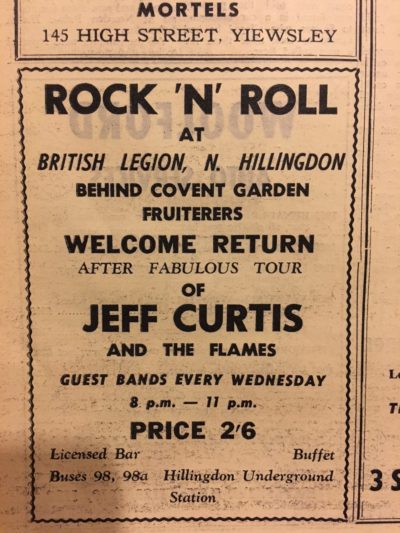
Curtis started to piece together a new version of The Flames in late 1962/early 1963, starting with Hounslow-based bass player Dave Wigginton (b. 25 February 1943, Isleworth, Middlesex), who held a senior position at an import/export warehouse at London (later Heathrow) Airport during the day, and was working with Twickenham outfit, Johnny & The Pursuers, who played at the JC Rock Club. Thanks to Wigginton’s connections, the new Flames would use the warehouse to rehearse in the evenings. The bass player quickly recommended fellow Pursuers’ guitarist Louis McKelvey (b. 31 October 1943, Killorglin, County Kerry, Eire).
Born above a pub Louis McKelvey came from an artistic background; his mother and father worked in theatre. After boarding at Silverlands House in Chertsey, he attended school in Twickenham, Middlesex, where he was classmates with Don Craine, later of The Downliners Sect fame. McKelvey’s first band was local outfit Johnny & The Pursuers.
Soon after, Curtis recruited rhythm guitarist Keith Gardiner (b. September 1942). In late 1957, when he was 15 years old, Gardiner had befriended 10-year-old drummer John “Mitch” Mitchell at Tudor Rose Youth Club in Southall, Middlesex and had formed a rudimentary band together with guitarist Pete Ross, who subsequently went on to Ealing band, The Flexmen. At the time, Mitchell was attending Jim Marshall’s shop in Hanwell, Middlesex where he was taking drum lessons while Gardiner was taking guitar lessons from top session player, the late Big Jim Sullivan among others.
Wiggington recommended Malcolm Tomlinson (b. 16 June 1946, Isleworth, Middlesex) on drums around December 1962 after seeing him at a local youth club playing with The Panthers. Tomlinson was brought up in Cranford, near London Airport, where his parents worked for British Airways.
A talented musician, who later became a multi-instrumentalist, Tomlinson had attended Spring Grove Grammar School in Isleworth where he was classmates with fellow drummer Mick Underwood, who went on to work with The Outlaws with Ritchie Blackmore among others, and guitarist Tony Bramwell (see later entry). Initially a guitarist, Tomlinson started playing drums in late 1962 and soon proved his natural ability on the kit.
The new formation debuted at Curtis’s Hillingdon club but it soon closed down.
Keith Gardiner says the band opened for The Rolling Stones a couple of times at the Station Hotel in Richmond during February-March 1963 before the club was renamed the Crawdaddy. They also played at the Ealing Club during this period a few times.
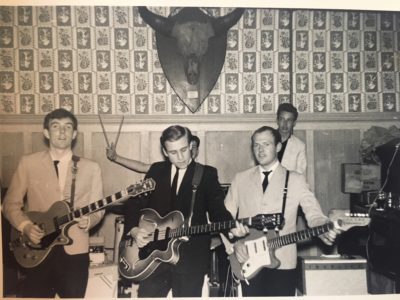
Around March 1963, the musicians completed the new formation with jazz enthusiast, Harrow-on-The-Hill-based sax player Malcolm Randall (b. October 1942, Hendon, Middlesex), who later earned the nickname C B (current bun). Randall’s debut was a gig in Brighton.
Competing with The Rolling Stones, another Ealing Club regular, for local area gigs, Curtis’s band started to travel further afield, including the Whisky A Go Go in Manchester.
During 1963, they backed singer Roly Daniels for a show in Catford in Southeast London.
Wigginton remembers playing a club on Jermyn Street in central London in the early days. He also says the band performed at Chiswick Polytechnic, Wandsworth Polytechnic and Chiswick Town Hall during this period.
After working with a manager who also looked after local group Pete Nelson & The Travellers, Jeff Curtis & The Flames signed to Bob Potter’s agency and started working around the Surrey/Hampshire area, including the Agincourt Ballroom in Camberley.
During this time, they opened for Freddie & The Dreamers at Botwell House in Hayes, Middlesex and Cliff Bennett & The Rebel Rousers at Kew Boathouse among others.
Jeff Curtis & The Flames #2 (Circa December 1962-December 1963)
Jeff Curtis – lead vocals
Louis McKelvey – lead guitar
Keith Gardiner – rhythm guitar, backing vocals
Malcolm Randall – saxophone (joined around March 1963)
Dave Wigginton – bass
Malcolm Tomlinson – drums/backing vocals

On 1 June 1963, Jeff Curtis & The Flames played their most high-profile gig to date, appearing with a number of local West London bands on the “Rock Twist Jive Channel Crossing”, a rock extravaganza that took place on-board the Channel ferry, the M V Royal Daffodil, which sailed from Southend, Essex to Boulogne. The billing included Tomlinson’s future band leader, Fulham-based singer Jimmy Marsh and his former Spring Grove class mate, Mick Underwood who was playing with The Outlaws and backing the show’s headline act, Jerry Lee Lewis.



On 4 October 1963, Jeff Curtis & The Flames were given the opportunity to record some demos. The band (minus Malcolm Randall) cut a four-track acetate at Lansdowne Recording Studios on Lansdowne Road in Holland Park, which comprised covers of Chuck Berry’s “Bye Bye Johnny” and “It Don’t Take But A Few Minutes” (with Lenny Hastings on drums); Robert Allen and Richard Adler’s “Everybody Loves a Lover”; and Bobby Troup’s “Route 66”.
Two tracks were allegedly readied for release as a single for HMV but when this did not happen, Gardiner departed and dropped out of the music scene, although he did briefly sub for Ken Lundgren in The Outlaws at a few gigs.
Years later he formed his own band The Keith Gardiner Band (KGB), which performed around the Shepperton, Middlesex area.
Acid Jazz Records subsequently used one of the recordings for its Rare Mod CD series.
Notable gigs:


19 January 1963 – Walthamstow Assembly Hall, Walthamstow with The Gallions and Paul & The Alpines (billed as The Flames)
9 March 1963 – Hillingdon Club, Sevenoaks, Kent

20 March 1963 – British Legion Hall, South Harrow, Middlesex

3 May 1963 – St Peter’s Hall, Kingston Upon Thames, Surrey with The Sinners (billed as The Flames) First time in Kingston

10 May 1963 – Weybridge Hall, Weybridge, Surrey
1 June 1963 – Rock Twist Jive Channel Crossing with Jerry Lee Lewis & The Outlaws, The Four Whirlwinds, The Del-Lormes, Johnny Angel, Nero & The Gladiators, Dane Robert, Vicki Rowe, Ricky Valance, The Fabulous Fleerekkers, Colin Chapman and Jimmy Marsh

14 June 1963 – St Peter’s Hall, Kingston Upon Thames, Surrey with Tony Clayton & The Impalas (billed as The Fabulous Flames with saxophone backing)
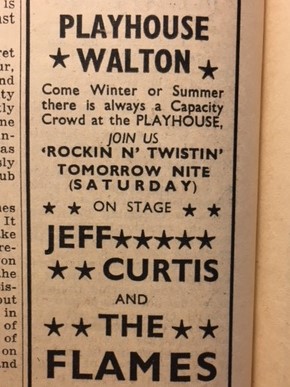
20 July 1963 – Walton Hop, Walton-on-Thames, Surrey

2-3 August 1963 – Silver Blades, Streatham, London

28 September 1963 – Agincourt Ballroom, Camberley, Surrey with Allen & The Blue Diamonds (billed as The Flames) According to Keith Gardiner who is in touch with the guitarist from Tommy Bruce’s band, The Flames actually played on 29 September as the opening act

12 October 1963 – Walthamstow Assembly Hall, Walthamstow with Mel James & The Meltones and Jimmy Ritchie Combo (billed erroneously as Jess Curtis & The Flames)
30 November 1963 – Walton Hop, Walton-on-Thames, Surrey
Jeff Curtis & The Flames #3 (December 1963-July 1964)
Jeff Curtis – lead vocals
Louis McKelvey – lead guitar
Ray Soper – organ
Malcolm Randall – saxophone
Dave Wigginton – bass
Malcolm Tomlinson – drums/backing vocals
Jeff Curtis replaced Keith Gardiner with Putney, Surrey-based organist Ray Soper (b. 9 May 1941, Battersea, London), who would play with The Flames on several occasions over the next two years, venturing off to perform with various other local groups. Soper had gone to Sir Walter St John Grammar School in Battersea, south London and started playing classical piano at six years of age. In 1959, when he was 18 years old, Soper began working with local rock groups in the Chelsea area.
Around February 1964, the band did a demo session with Decca Records in West Hampstead but nothing came from it.
After leaving Bob Potter’s agency, Jeff Curtis & The Flames got work with the Roy Tempest agency. The new line up continued to gig widely but Tomlinson started to get bored.
In mid-summer the drummer took up an offer from former Fairlanes lead singer Jimmy Marsh, who he’d met on the cross Channel gig the previous summer, to join his new band, The Del Mar Trio. Tomlinson subsequently went on to play with The Noblemen, The Motivation, The Penny Peeps and Gethsemane before immigrating to Canada in January 1969 and continuing his musical career there. He subsequently worked with the likes of Bill King and Rick James among others and cut two solo albums in the late Seventies.
Notable gigs:
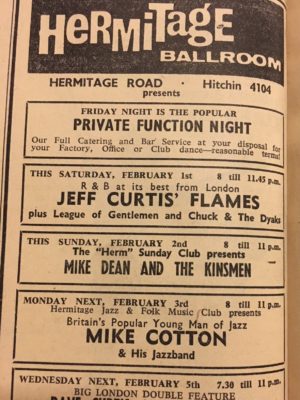
1 February 1964 – Hermitage Ballroom, Hitchin, Herts with The League of Gentlemen and The Dyaks

29 February 1964 – Walthamstow Assembly Hall, Walthamstow with Pat McQueen Combo and The Preachers

14 March 1964 – Starlight Ballroom, Boston Gliderdrome, Lincolnshire with The Rattles (billed as Geoff Curtis & The Flames)

26 March 1964 – Ealing Club, Ealing, Middlesex
2 April 1964 – Ealing Club, Ealing, Middlesex
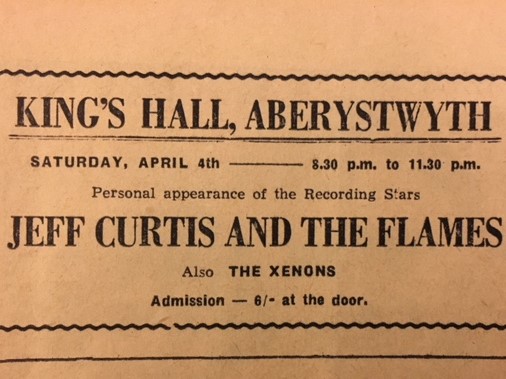
4 April 1964 – King’s Hall, Aberystwyth, Wales
5 April 1964 – Southall Community Centre, Southall, Middlesex with The Rattles
9 April 1964 – Ealing Club, Ealing, Middlesex
16 April 1964 – Ealing Club, Ealing, Middlesex

23 April 1964 – Ealing Club, Ealing, Middlesex
30 April 1964 – Ealing Club, Ealing, Middlesex
2 May 1964 – Silver Blades, Streatham, London

14 May 1964 – Rocky Rivers Top 20 Club, Conservative Club, Bedford
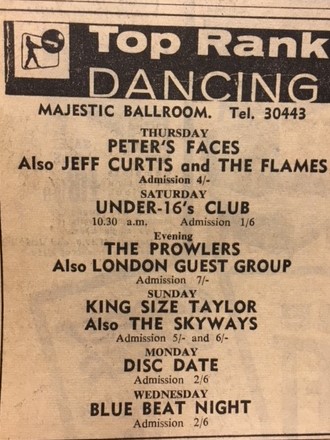
18 June 1964 – Majestic Ballroom, Luton, Beds with Peter’s Faces
Jeff Curtis & The Flames #4 (July 1964-January 1965)
Jeff Curtis – lead vocals
Louis McKelvey – lead guitar
Malcolm Randall – saxophone
Ray Soper – keyboards (left around September 1964)
Dave Wigginton – bass
Pete Burt – drums
+
Jeff Lake – saxophone (joined around September 1964)
The band’s new drummer was Pete Burt (b. 20 August 1946, Redhill, Surrey), younger brother of Mick Burt, sticks man with Cliff Bennett & The Rebel Rousers, who answered an advert in the music press. Brought up in South Harrow, Middlesex where he attended Roxeth Manor School, Burt had previously played with a non-professional band that started life at Botwell House, Hayes backing singer Robert (Bob) Chambers.
In an amazing twist of fate, the lead guitarist in the band was Tony Bramwell, Pete Burt’s predecessor Malcolm Tomlinson’s former class mate from Spring Grove Grammar School in Isleworth. The band played a couple of gigs before splitting up around mid-1964. Bramwell then went on to play with local bands, The Fantoms, The Fantom Creed, The Sheratons and The Hum Drum Band.
Sometime in August, the band auditioned for Joe Meek for the first time.
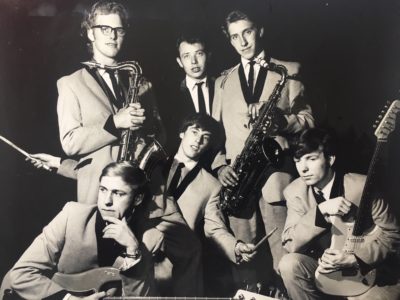
Around late September 1964, Ray Soper was sacked and Malcolm Randall introduced his friend, sax player Jeff Lake. Soper immediately found work with Buddy Britten & The Regents alongside future Deep Purple bass player Nick Simper. He would then work with Cyrano & The Bergeracs, where he reunited with Simper in 1965 but would remain on the fringes of The Flames.
Shortly after Jeff Lake’s arrival, the band returned to Lansdowne Recording Studios in October 1964 to record a two-track demo that included a cover of Solomon Burke and Bert Berns’ “Down In The Valley”.
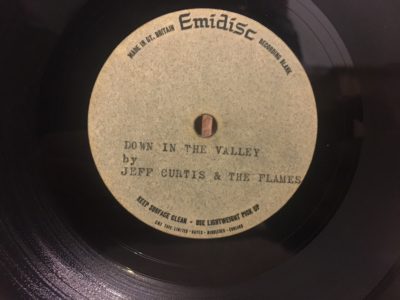
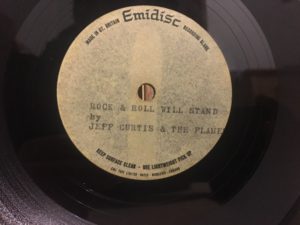
McKelvey, however, was also growing restless and departed in early January 1965. On the afternoon of his wedding day (most likely in June 1965), he headed to Germany to reunite with former Jeff Curtis & The Flames drummer Malcolm Tomlinson, who was working with James Deane & The London Cats. The guitarist gigged with The London Cats for about a month before returning to London.
Then, around September 1965, McKelvey travelled to South Africa and ended up recording with The Upsetters and The A-Cads. In April 1966, The A-Cads moved to the UK to work with producer Mickie Most but when nothing happened, the guitarist moved to Montreal in September. Based in Canada, McKelvey recorded with Our Generation and Influence before returning to the UK in July 1968 briefly.
Back home he reunited with former Jeff Curtis & The Flames drummer Malcolm Tomlinson. The pair relocated to Toronto in January 1969 where they formed Milkwood and recorded an unreleased album with legendary producer, the late Jerry Ragavoy for Polydor Records. McKelvey would subsequently work with Toronto bands, Damage (alongside Tomlinson) and Powerhouse and record with Marble Hall. He currently lives in Toronto.
Notable gigs:
2 July 1964 – Majestic Ballroom, Luton, Beds with The All Stars

10 July 1964 – Berkhamsted Town Hall, Berkhamsted, Herts
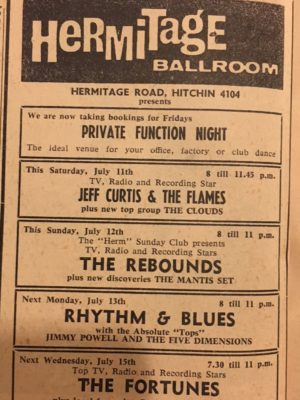
11 July 1964 – Hermitage Ballroom, Hitchin, Herts with Clouds
18 July 1964 – Marcam Hall, March, Cambridgeshire
1 August 1964 – The Gaiety, Ramsey, Cambridgeshire with The Swinging Sounds
6 August 1964 – Rocky Rivers Top 20 Club, Conservative Club, Bedford, Bedfordshire
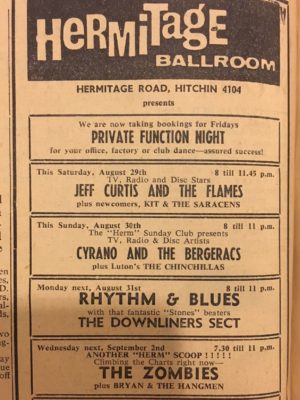
29 August 1964 – Hermitage Ballroom, Hitchin, Herts with Kit & The Saracens
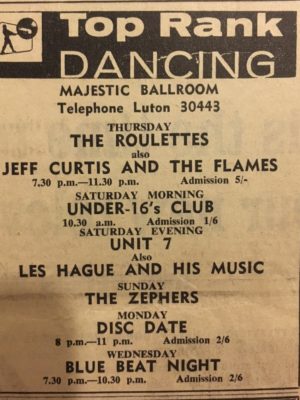
8 October 1964 – Majestic Ballroom, Luton, Beds with The Roulettes

5 December 1964 – Hermitage Ballroom, Hitchin, Herts with The Midniters
8 December 1964 – Floral Hall, Gorleston-on-Sea, Norfolk
19 December 1964 – Ealing Club, Ealing, Middlesex with The Hobos
2 January 1965 – St George’s Hall, Exeter, Devon with Roger & The Sabres (billed as The Flames)
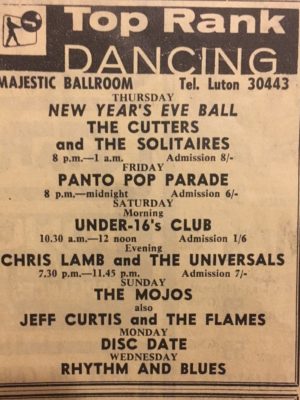
3 January 1965 – Majestic Ballroom, Luton, Beds with The Mojos

Jeff Curtis & The Flames #5 (January-February 1965)
Jeff Curtis – lead vocals
Dave Caralambous (aka Dave Carol) – lead guitar
Jeff Lake – saxophone
Malcolm Randall – saxophone
Dave Wigginton – bass
Pete Burt – drums
Dave Marcus Theos Michael Caralambous aka Dave Carol (b. Dave Charalambous, 14 January 1949, Isleworth, Middlesex) was brought up in nearby Twickenham. His first band was The Drovers, which he joined around 1962 and also included rhythm guitarist Richard Allen and drummer Geoff Coxon, who would feature in The Flames’ history in later years when they changed name to The Kool.
In late 1963, The Drovers changed name to The Smokestacks after lead singer Mike Smith joined and Brian Hosking from Twickenham band, The Legend, joined on bass. The Smokestacks became resident band at the 51 Club in central London. In the summer of 1964, Carol joined Hounslow band, The Valkeries and remained with them until January 1965 when he joined The Flames. He was also in the same class at school as McKelvey’s younger sister. Carol says he made his debut at the Locarno Ballroom in Swindon.
The changes, however, didn’t end there. Sax player Malcolm Randall left in early February and subsequently joined Bognor Regis band Beau Brummell & The Noblemen for about six months. In July 1965, he jumped ship to join Manchester’s Playboys.
While with that band, Randall appeared on an excellent soul single for Fontana – “I Feel So Good” c/w “I Close My Eyes”. In an incredible twist of fate, during late 1966, Malcolm Randall was playing with Manchester’s Playboys at Liverpool’s Cavern Club when he saw the latest version of The Noblemen on stage and was amazed to see his former Jeff Curtis & The Flames compatriot Malcolm Tomlinson playing drums!
After leaving Manchester’s Playboys in mid-1968, Malcolm Randall moved to Cambridgeshire and ended up working with Red Express during the 1970s, which later morphed (after Randall had left) into Shakatak. He then worked with Sindy & The Action Men among others.
In need of a replacement, Jeff Lake introduced his friend from Harrow – George Russell.
Notable gigs:
11 January 1965 – Locarno Ballroom, Swindon, Wiltshire with Sonny Childe & The Elders Consolidated
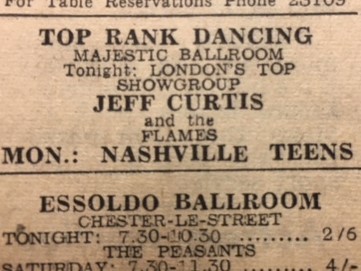
22 January 1965 – Majestic Ballroom, Newcastle upon Tyne, Tyne & Wear
23 January 1965 – Marcam Hall, March, Cambridgeshire with The Fourmost
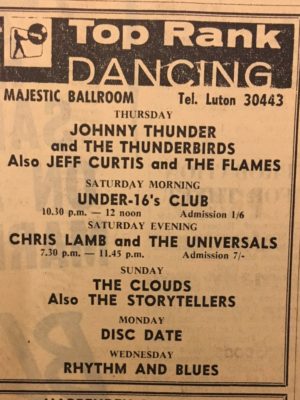
28 January 1965 – Majestic Ballroom, Luton, Bedfordshire with Johnny Thunder & The Thunderbirds
13 February 1965 – Starlight Ballroom, Boston Gliderdrome, Lincolnshire with The Searchers and Rodgers Lodgers (possibly one of George Russell’s first gigs)

Jeff Curtis & The Flames #6 (February-April 1965)
Jeff Curtis – lead vocals
Dave Caralambous (aka Dave Carol) – lead guitar, vocals
Jeff Lake – saxophone
George Russell – saxophone
Dave Wigginton – bass
Pete Burt – drums
With two of the early band members gone, including his former band mate from Johnny & The Pursuers, Louis McKelvey, Dave Wigginton handed in his notice and agreed to work until mid-April. His replacement was Ray Brown (b. 1944, Hayes, Middlesex), who ended up buying Wigginton’s pink Fender Precision bass. Having rehearsed with Jeff Curtis’s band since January, Brown made his debut with Jeff Curtis & The Flames at Walthamstow Assembly Hall on 24 April.

Brown started with the Sky Blue Skiffle Group in 1956 and two years later appeared on BBC TV’s Carol Levis Junior Discoveries. In 1961-1962, he worked with Hayes band The Preachers and also spent a brief period in a short-lived group with Nick Simper. Soon after joining The Flames, Brown and his school friend Steve Reading from the Sky Blue Skiffle Group wrote and sang backing vocals on “Heart Full of Sorrow” by Heinz, which was released on Columbia in November 1965.
Notable gigs:

28 February 1965 – Olympia, Cromer, Norfolk with Circuit Five

5-6 March 1965 – Boulevard, Tadcaster, North Yorkshire with The McCoys

3 April 1965 – Starlight Ballroom, Boston Gliderdrome, Lincolnshire with The Barron Knights

9 April 1965 – California Ballroom, Dunstable, Bedfordshire with The Escorts and Beaux Maverix (billed as Geoff Curtis & The Flames)
10 April 1965 – Floral Hall, Gorleston-on-Sea, Norfolk with Confessors
17 April 1965 – The Gaiety, Ramsey, Cambridgeshire with The Sons of Adam
Jeff Curtis & The Flames #7 (April-July 1965)
Jeff Curtis – lead vocals
Dave Caralambous (aka Dave Carol) – lead guitar, vocals
Jeff Lake – saxophone
George Russell – saxophone
Ray Brown – bass
Pete Burt – drums
The new line up gigged around the country and on 9 May appeared on the same bill as Beau Brummell & The Noblemen (featuring former member Malcolm Randall) at the Majestic Ballroom in Luton.
A few days after a gig at Clacton Town Hall with Cops ‘N’ Robbers in late June, Jeff Lake and George Russell took a holiday (a trip to Frankfurt to visit former member Malcolm Randall who was playing with Beau Brummell & The Noblemen), which didn’t go down well with singer Jeff Curtis.
Curtis had a band rule that the musicians all had to take a two-week summer holiday at the same time, usually in August. On their return in July, the two sax players were told their services were no longer needed.
Lake subsequently played with a number of local bands before reuniting with former Jeff Curtis & The Flames member Malcolm Randall as road manager for Manchester’s Playboys, which included their Swedish trip in September 1967. On his return, he joined Tommy Bishop & The Rock ‘N’ Roll Revival Show and appeared on the 1968 Decca single “Midnight Train” c/w “Oh Boy”.
Russell joined Hayes, Middlesex band, The Satellites in mid-1966, who changed name to The Army later that year. The band also included future Sweet bass player Steve Priest and cut two recordings in 1967 – covers of the Joe Tex hit “Sugar” and Sam & Dave’s “You Don’t Know Like I Know”. Russell remained with The Army until late 1968/early 1969. He subsequently gigged with Orange Rainbow before moving to Australia. He later returned to live in Hertfordshire.
Notable gigs:

24 April 1965 – Walthamstow Assembly Hall, Walthamstow, London

29 April 1965 – Rocky Rivers Top 20 Club, Conservative Club, Bedford (back by demand)
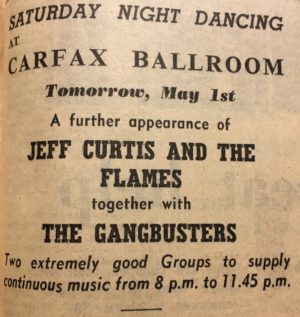
1 May 1965 – Carfax Ballroom, Oxford with The Gangbusters
3 May 1965 – Radlett (most likely Radlett Centre), Hertfordshire
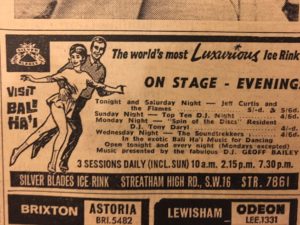
7-8 May 1965 – Silver Blades, Streatham, London
9 May 1965 – Majestic Ballroom, Luton with Beau Brummell & The Noblemen (former member Malcolm Randall on sax with The Noblemen)
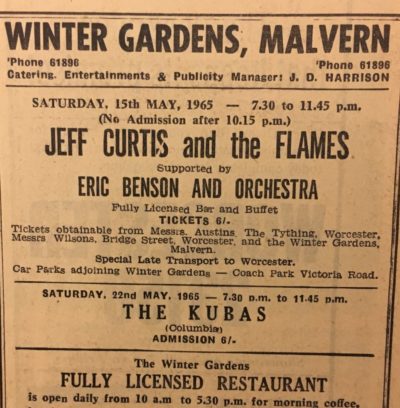
15 May 1965 – Malvern Winter Gardens, Malvern, Worcestershire with Eric Benson & Orchestra
22 May 1965 – Manor Lounge, Stockport, Greater Manchester with The Thingumajigs (Stockport County Express) Gig cancelled
29 May 1965 – Starlight Ballroom, Boston Gliderdrome, Lincolnshire with The Hollies and The Red Squares
11 June 1965 – California Ballroom, Dunstable (replaced one of the billed acts)
12 June 1965 – Rivoli Ballroom, Brockley, London
18 June 1965 – USAF base, South Ruislip, London
25 June 1965 – USAF base, High Wycombe, Buckinghamshire
26 June 1965 – Clacton Town Hall, Clacton-on-Sea, Essex with Cops ‘N’ Robbers (last gig with Jeff Lake and George Russell)
1 July 1965 – Ealing Club, Ealing, London (reduced to four piece)

3 July 1965 – Hermitage Ballroom, Hitchin, Hertfordshire with Peter Fenton & The 3,000
4 July 1965 – Woodhall Community Centre, Welwyn Garden City, Hertfordshire


Jeff Curtis & The Flames #8 (July 1965-May 1966)
Jeff Curtis – lead vocals
Dave Caralambous (aka Dave Carol) – lead guitar, vocals
Ray Soper – keyboards
Ray Brown – bass
Pete Burt – drums
On 5 July, Jeff Curtis auditioned two sax players to replace Jeff Lake and George Russell but decided against keeping the horns and instead invited former member Ray Soper to re-join the band on keyboards. Soper had been playing with future Deep Purple bass player Nick Simper in Cyrano & The Bergeracs for several months and then a group formed by the lead singer of The Gobbledegooks but had helped out at the auditions in January 1965, which had brought in Carol and Brown.
Ray Brown had a prearranged week’s holiday from 10-17 July and his predecessor Dave Wigginton returned to honour engagements in his absence, which included a gig at the Ticky Rick Club in Basingstoke, Hants on 17 July. With Brown back from his holiday, the five-piece rehearsed on 21 July before playing their first gig together at Luton’s Majestic Ballroom where there was a bomb scare.
Often billed as simply “The Flames”, the new line up lasted nearly a year (although Soper left in November briefly to work with a Casino band on the Isle of Man, which lasted a week before he returned).
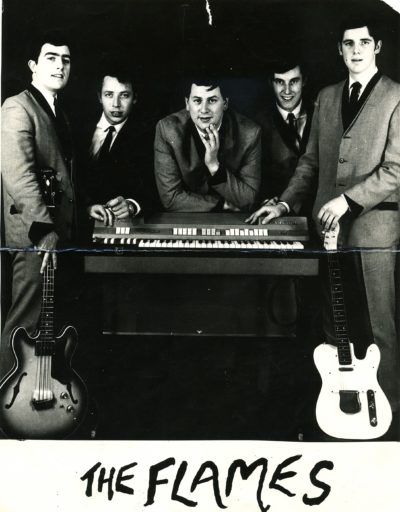
Pete Burt, who worked as a window cleaner when The Flames weren’t gigging, got a window cleaning job with British rock ‘n’ roll legend, Johnny Kidd, who had split from his longstanding backing band, The Pirates on 19 April 1966. Kidd offered The Flames some work to fulfil his outstanding dates.
During late April/early May 1966, The Flames spent about a week backing the singer, including playing a gig at Chatham Dockyard Naval base, but the arrangement did not suit either party.
Around this time, The Flames returned to Lansdowne Studios to cut two original recordings – the David Myers/Ray Brown collaborations, “Room at the Top” and “I Ain’t The Fool”. The former was later cut by the band’s new identity, The Kool, in the summer of 1967. They also did a second audition with Joe Meek.
After Ray Soper was ousted from The Flames in May, he decided to stick with Kidd and formed a new version of The Pirates. The New Pirates (as they were called) supported Johnny Kidd throughout the summer but Soper stopped playing with the band in August. Two months later, he joined Bristol band, The Denims who were playing US bases in France. After working in Strasbourg for two months as The Headline News, he returned to the UK in April 1967.
Three months later, Soper found work playing in a band on the Cunard Cruise liner Carmania, which travelled between Southampton and Montreal on a six-week passage. Marrying a Canadian, he subsequently immigrated to Canada in 1970 and until recently played with The Dusty Roads Band from his home in Ontario. He also works as a film extra.
Notable gigs:

17 July 1965 – Ricky Tick Club, Carnival Hall, Basingstoke, Hants (Dave Wigginton fills in for Ray Brown)
22 July 1965 – Majestic Ballroom, Luton, Bedfordshire (RayBrown returns and Ray Soper’s first gig back with the band)

24 July 1965 – Locarno Ballroom, Swindon, Wiltshire with The Rising Sons

25 September 1965 – Il Rondo, Leicester

2 October 1965 – Adelphi Ballroom, Slough, Berkshire
30 October 1965 – Woodhall Community Centre, Welwyn Garden City, Hertfordshire

11 November 1965 – Byron Hotel, Greenford, London with The Keystones (billed as The Flames)

Jeff Curtis & The Flames were featured in the Surrey Comet‘s 13 November 1965 issue but it was full of factual errors (above)
9 December 1965 – Byron Hotel, Greenford, London with the Harmonies
 16 December 1965 – Ealing Club, Ealing, London
16 December 1965 – Ealing Club, Ealing, London
18 December 1965 – Adelphi Ballroom, Slough, Berkshire
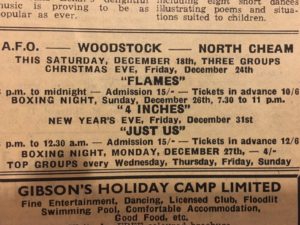
24 December 1965 – Woodstock Roadhouse, North Cheam, London
1 January 1966 – Starlight Ballroom, Boston Gliderdrome, Lincolnshire with The Nashville Teens and The Game
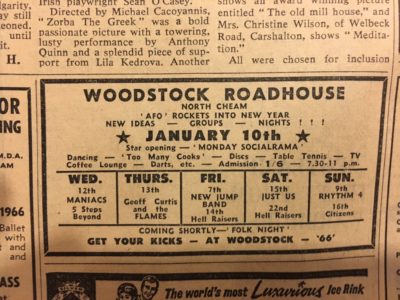
13 January 1966 – Woodstock Roadhouse, North Cheam, London (billed as The Flames)
22 January 1966 – Locarno Ballroom, Swindon, Wiltshire with Plain and Fancy
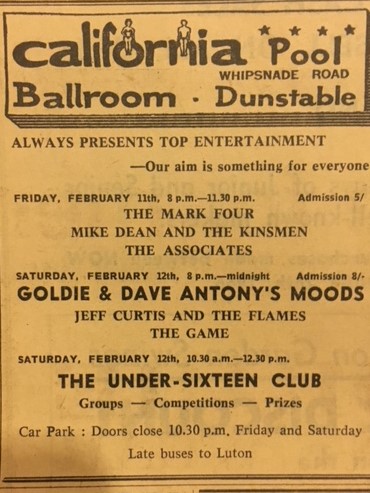
12 February 1966 – California Ballroom, Dunstable, Bedfordshire with Goldie & Dave Antony’s Moods and The Game
17 February 1966 – Byron Roadhouse, Greenford, London with The Mode (billed as The Flames)
31 March 1966 – Byron Roadhouse, Greenford, London with The Legends (billed as The Flames)

23 April 1966 – Adelphi Ballroom, Slough, Berkshire
7 May 1966 – Locarno Ballroom, Swindon, Wiltshire with The Ying Yongs and The Cotswold Stones (one of Ray Soper’s final gigs)
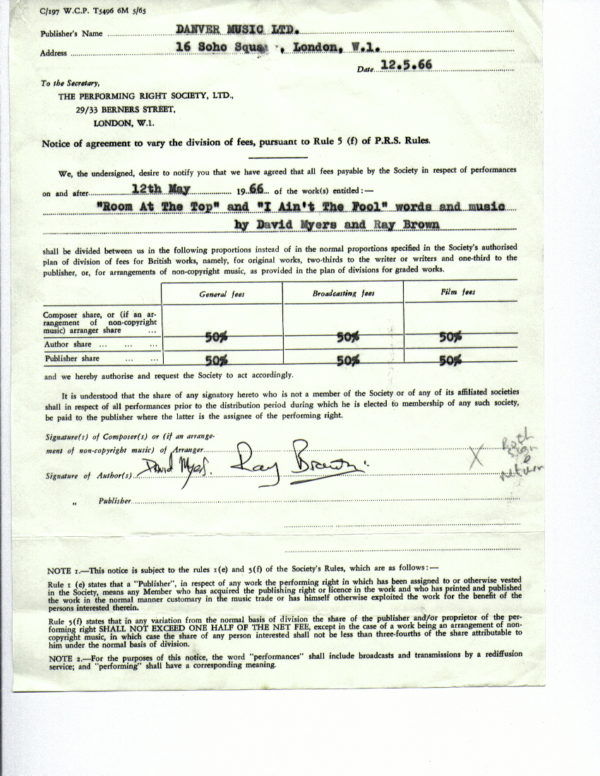

Jeff Curtis & The Flames #9 (May 1966-August 1967)
Jeff Curtis – lead vocals
Dave Carol – lead guitar, vocals
Jet Hodges (aka Richard Hodgins) – keyboards, vocals
Ray Brown – bass
Pete Burt – drums
The remaining members brought in Richard Hodgins, a keyboard player from Shepperton, Surrey, who used the stage name, Jet Hodges. Originally a bass player, Hodges had taken up music full time after training to be an architect.
Increasingly, the band moved away from using the name, Jeff Curtis & The Flames for live shows and often went by the name, The Jeff Curtis Set or just The Flames. One of the highlights from this period was opening for Ike & Tina Turner when they played at the California Ballroom in Dunstable.
In late 1966, rock promoter and entrepreneur Mervyn Conn, started to represent the band. In December 1966, he added Jeff Curtis & The Flames to a Who concert in Sunderland and renamed the band The Kool for this one-off gig, although the group didn’t appear at the venue.
After signing to CBS Records, Conn decided that The Kool was more representative of the band’s evolving sound and renamed them as the band’s debut single hit the shops.
Notable gigs:

11 June 1966 – Corby Civic Centre, Corby, Northamptonshire with Two of Each (billed as The Flames)
20 August 1966 – Locarno Ballroom, Swindon, Wiltshire with The Showmen

2 September 1966 – Woodstock Roadhouse, North Cheam, London (billed as The Flames)

3 September 1966 – Maple Ballroom, Northampton with Sexion A (billed as The Flames)
18 September 1966 – White Lion, Edgware, London (billed as The Flames)
24 September 1966 – Drill Hall, North Cheam, London with The Fourtunes

2 October 1966 – Prince of Wales, Kinsbury, London
22 October 1966 – California Ballroom, Dunstable with Ike & Tina Turner Revue & The Ikettes (with others)

24 October 1966 – Tiles, Oxford Street, London with Edwin Starr

30 October 1966 – Woodstock Roadhouse, North Cheam, London (billed as The Flames)
5 November 1966 – Locarno Ballroom, Swindon, Wiltshire with The Undertakers and Some Other Guys. Billed as The London Flames (Jeff Curtis)
10 November 1966 – Byron Roadhouse, Greenford, London with The Boots (billed as The Flames)

12 November 1966 – Drill Hall, North Cheam, London with 5 Steps Beyond (billed as The Flames)

13 November 1966 – Adelphi Ballroom, Slough, Berkshire
18 November 1966 – Woodstock Roadhouse, North Cheam, London (billed as The Flames)
10 December 1966 – Empire Theatre, Sunderland, County Durham with The Who, Dave Berry, She Trinity, The Slade Brothers and The Peddlers (billed as The Kool but band did not appear)

18 December 1966 – Woodstock Roadhouse, North Cheam, London (billed as The Flames)
15 January 1967 – White Lion, Edgware, London (billed as The Flames)
28 January 1967 – Queens Hall, Watton, Norfolk with The Eyes of Blond and The Bohemians
19 February 1967 – Kingsway Theatre, Hadleigh, Essex (billed as Flames)
9 March 1967 – Upper Cut, Forest Gate, Essex with The Style (billed as Jeff Curtis Set)
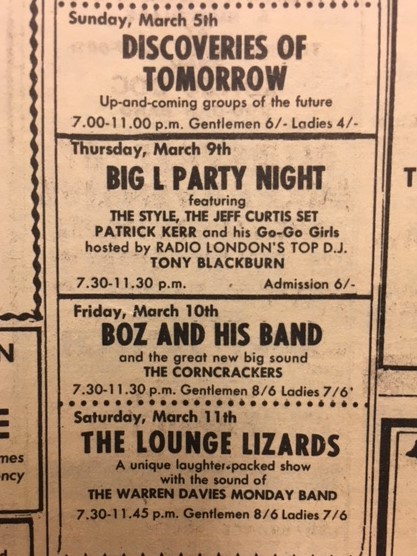
27 March 1967 – Woodstock, North Cheam, London with The Starfires (billed as The Flames)
9 June 1967 – California Ballroom, Dunstable, Bedfordshire with Allen Bown Set (billed as Geoff Curtis Set)

Many thanks to Dave Wigginton, Keith Gardiner, Louis McKelvey, Malcolm Tomlinson, Pete Burt, Dave Carol, Malcolm Randall, Ray Soper, Jeff Lake, Ray Brown, George Russell, Jimmy Marsh, Ian Hannah, Brian Hosking, Richard Bennett and Tony Bramwell.
Concert adverts taken from a number of newspapers including the Ampthill News & Weekly Record, Lincolnshire Standard, the Luton News, the Streatham News, the Surrey Comet, Walthamstow Guardian, Exeter Express & Echo, Cambridgeshire Times, Yarmouth Mercury, Middlesex County Times and West Middlesex Gazette, Hertfordshire Express, Hants & Berkshire Gazette, Hounslow Post, NME, Sevenoaks Chronicle, Westerham Courier and Kentish Advertiser and Melody Maker.
Huge thanks to Dave Wigginton, Keith Gardiner, Louis McKelvey, Malcolm Randall, Jeff Lake, Ray Brown and Ray Soper for photos.
Copyright © Nick Warburton. All Rights Reserved. No part of this article may be reproduced or transmitted in any from or by any means, without prior permission from the author.
I have tried to ensure the accuracy of this article but I appreciate that there are likely to be errors and omissions. I would appreciate any feedback from anyone who can provide any additions or corrections.
Email: Warchive@aol.com












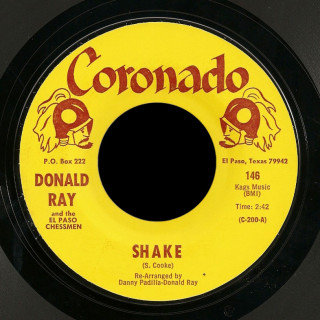

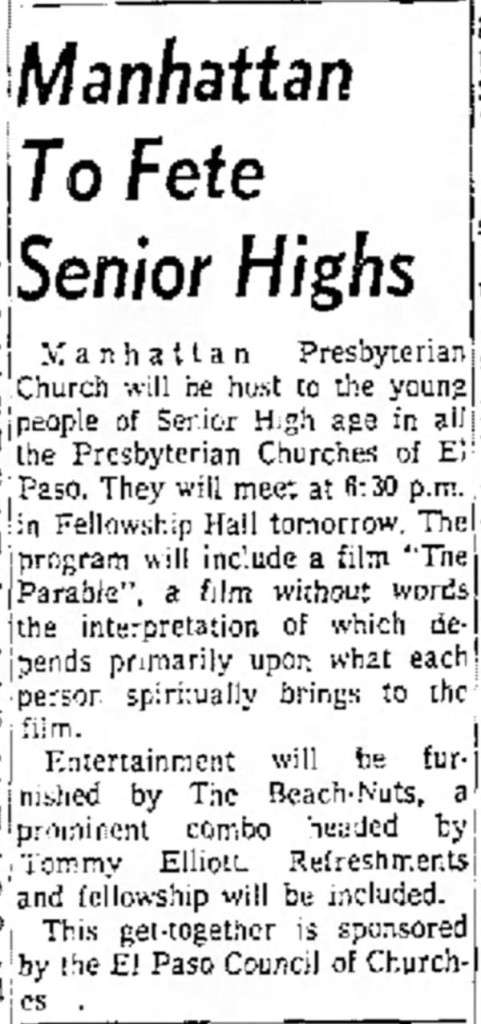
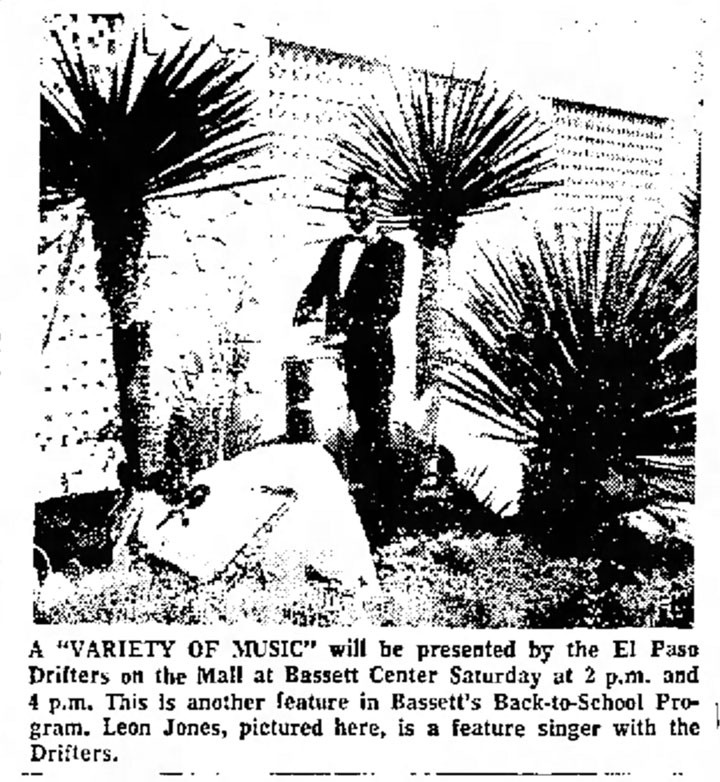
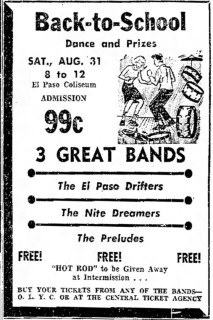
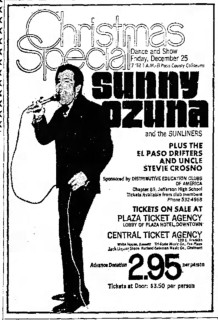

 The RCA mastering number TK4M-6763/4 shows Midgard Records owner Chuck Regenberg sent this tape to RCA’s Indianapolis plant at the same time as fellow Midgard release the
The RCA mastering number TK4M-6763/4 shows Midgard Records owner Chuck Regenberg sent this tape to RCA’s Indianapolis plant at the same time as fellow Midgard release the 

 Primates
Primates



 Any help with this discography would be appreciated.
Any help with this discography would be appreciated.  More info on Steve Crosno can be found at
More info on Steve Crosno can be found at 




 Pat Waddell – lead vocals, replaced by Dean Dietz
Pat Waddell – lead vocals, replaced by Dean Dietz Needing a follow up to “Nina-Kocka-Nina” they predictably cut another song in that vein. “Kocka-Mow-Mow” lacks the magic of the first record. Instead of being a band original, it was knocked off by two of Ray Ruff’s associates: Jack Dunham again, and Royce Taylor, a singer who had his own 45 for Sully as part of Gaylen & Royce, “I Can’t Stay” / “Modern Day Fools”.
Needing a follow up to “Nina-Kocka-Nina” they predictably cut another song in that vein. “Kocka-Mow-Mow” lacks the magic of the first record. Instead of being a band original, it was knocked off by two of Ray Ruff’s associates: Jack Dunham again, and Royce Taylor, a singer who had his own 45 for Sully as part of Gaylen & Royce, “I Can’t Stay” / “Modern Day Fools”. The band was started earlier by Steve Kadel, from Beloit, Kansas. He was one of my best friends growing up in the 60’s. We graduated together in ’62. We learned guitars together during high school, by ear. We learned with 5-strings on our guitars–THANK GOD–there was no little E-string.
The band was started earlier by Steve Kadel, from Beloit, Kansas. He was one of my best friends growing up in the 60’s. We graduated together in ’62. We learned guitars together during high school, by ear. We learned with 5-strings on our guitars–THANK GOD–there was no little E-string. One of the hardest songs that I remember doing was “Slaughter on Tenth Avenue” by the Ventures. Our lead guitar, Bill Hollingsworth was the greatest, and I don’t think I could have learned the rhythm without his help. You mention “Surfing Bird” by The Trashmen: Bill was first cousins with their lead guitar player.
One of the hardest songs that I remember doing was “Slaughter on Tenth Avenue” by the Ventures. Our lead guitar, Bill Hollingsworth was the greatest, and I don’t think I could have learned the rhythm without his help. You mention “Surfing Bird” by The Trashmen: Bill was first cousins with their lead guitar player.

 The Intruders were from the small towns of Glenville and Scotia, outside Schenectady, New York. They were students at Burnt Hills-Ballston Lake and Scotia-Glenville High Schools and formed the band in 1964.
The Intruders were from the small towns of Glenville and Scotia, outside Schenectady, New York. They were students at Burnt Hills-Ballston Lake and Scotia-Glenville High Schools and formed the band in 1964.